|
|
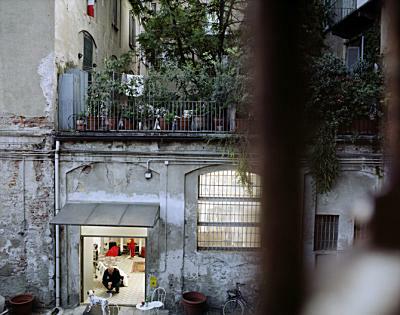
Giorgio Barrera Jarach Gallery
_______________________
Hives
Martin Earl
The media mimics disease. Its model follows that of any other pathology: replication, coloniza-tion and the gradual conversion of the hosting organism, into itself. “Streets that follow like a tedious argument / Of insidious intent”. We in the secular West, in the post-Wasteland world of kacotopia and gated enclaves, have even more to fear than Job, since the arbitrariness of our mechanistic God of information is garrulous compared with his Old Testament counterpart; the mediatic deity is, if anything, over-communicative, the big brother that never shuts up, drowning out any of the feeble piping we might muster. Even if our lack of existential control and the haplessness of our questioning have not changed all that much, the paradigm of the deity has been utterly inverted. Instead of the exacerbated remoteness of the Old Testament God, we have a kind of disembodied Dr. Ruth on anabolic steroids who suffers from general situation rage. We are no longer made in his image, he/she is made, and remade and made again, in ours. We are adrift, without consensus, without rudder. Nietzsche, Freud, Marx, et al, initiated a series of philosophical strategies to justify a Godless and arbitrary universe. But because the media is both theological and technological, both personal and impersonal, both highly present and invisible, because of its “insidious” capacity to overlap other systems, to project them even as it replaces them, because it cannot be avoided, because its infiltration has replaced ideology, Nietzsche, Freud, Marx, et al have been rendered merely “literary” finger food for students and specialists. Most of us just don’t have the time to stop long enough to take them seriously.
All systems, including the Arts, have had to adapt, have had to rewrite their basic algorithms, perhaps streamlining their lexicons, removing the grace notes and placing statement in the foreground. The prominence of conceptual art today, which puts the caboose before the engine, is typical of periods in which the criticism of the arts dominates the arts themselves. One of Dr Johnson’s many definitions of poetry serves well here: "Poetry is the art of uniting pleasure with truth by calling imagination to the help of reason." Poetry for Johnson becomes the handmaiden of reason.
And yet, of all the arts, poetry has failed most profoundly in this contemporary adventure of ad-aptation, and not for want of trying....(more)
_______________________

Marian Anderson
Lincoln Memorial Concert
April 9, 1939
About Marian Anderson and Her Lincoln Memorial Concert
Marian Anderson: A Life in Song
_______________________
One Writer’s Life (or, Call Me, Andy)
Eleanor Lerman
Literary Kicks
Person wanted to sweep up in harpsichord factory. That was the ad in the Village Voice that I answered in 1970 when I was eighteen years old and looking for a job so I could support myself in the city, where I was headed to join the revolution. It also happens to be the first line in Civilization,” a story in my new collection of short stories, The Blonde on the Train (Mayapple Press). The story is fiction, but the ad, the job -- and the way they both changed my life -- are still the touchstones I go back to again and again whenever someone asks, "What made you want to be a writer?"
It was actually reading Leonard Cohen that made me think I could write poetry (until I found The Spice Box of Earth on a drugstore rack in Far Rockaway, the lost and windy peninsula at the end of the earth -- excuse me, I mean, the end of Queens, where I lived when I was a teenager -- I was under the impression that poetry was written by people like Robert Browning and Lord Byron, who didn’t exactly resonate with me). But it was the harpsichord kit factory where I worked, the long-lost Greenwich Village of artists and gay bars and roller-skating queens, along with my neighbor, a film producer, who introduced me to a community of writers, and my boss, Michael Zuckermann, who gave me the job because he said I had soulful eyes (I hope I still do!), which in the psychedelic days was the only qualification you needed, I guess, to make harpsichord kit parts (I graduated from the sweeping up part pretty quickly) that made me believe it was possible to actually live the life of a writer. Thirty-five years later, I’m still trying, but I think I’m getting closer.(....)
... because I had learned to be a more skillful and disciplined poet—and had learned to read other writers in two ways: not only to enjoy their work but to try to understand, technically, what they were doing—I was able to start writing fiction again. I started with the short story form, though at first, once again, I didn’t have a lot of success getting published. I think part of the reason goes back to that "double X" business. Not that my work is raw in any way, or has sex scenes or violence or anything like that; it’s just that the subject matter has moved on to a kind of mixture of musings about getting older and about the mysterious "other" that must be out there somewhere (to quote Fox Mulder), which is something that I think haunts you both when you’re very young and when you’re getting past middle age. You just wonder if the problem-riddled, anxiety-producing, everyday reality you deal with actually does comprise the absolute boundaries of consciousness and even of the physical universe. Meaning, that while I was kind of mellow for a long time -- almost unconscious as I slogged back and forth to my office, the supermarket, the kitchen to make dinner -- I am, thankfully, becoming a little strange again. And I feel a little mysterious. A little amused that it’s taken so long for me to wise up....(more)
The Blonde on the Train
Short Stories Eleanor Lerman
_______________________

photo - mw
_______________________
Electronic Chapbook
Eleanor Lerman
drunken boat
The Orbit of the Moon
Eleanor Lerman
Decades later, after I made the worst of my mistakes
I realized that it was my uncle who I had followed
into the city. I took a room near Cooper Union so
I could ride buses past the scene of his departure into
physics, understanding he was the reason that fate
had spared the family: to save the boy who had to be
smuggled out of Odessa, the genius who had to grow up
When he was twenty-three he designed a satellite and
launched it from a dream. It was a secret among young
men, the fellow travelers, but I can still feel it in the
night sky, sleepless and forgotten, completing its
dark orbits year after year. Now I study because he told
me to: God leaves his messages in literature and science
Perhaps He can't keep himself from wanting us to know
In this life, moonlight lies in slices across the city. Tall
black buildings with white windows conceal what they
conceal. As the engineer became the physicist, converting
motion into theory—Thus do the wheels grind, the stars
provide, and heaven turn upon the milky river that is
the fodder for the mill—so have we converted rumor
into memory and memory into mind. All these lives
later, what was really learned in the yeshiva? That
the studious Jew was sifting through the universe, that
what he found was lonely and everlasting, and now
it comes to me. It comes to me: the love that began
the rumor, the philosophy that failed, the lives we
lived in the hope that there was something more. The
American wife. The autistic child. The stars, the mill,
the universe, the dream. A room where someone is still
studying. The past, the future. The orbit of the moon
Come the Sweet by and by: Poems
Eleanor Lerman google books
The Mystery of Meteors
Eleanor Lerman google books
_______________________
 Marian Anderson
Lincoln Memorial Concert
April 9, 1939

photo - mw
_______________________
I believe that we make images not simply because we are creatures who seek to loose ourselves within a pattern's mastery, but that the making of images is one of the means by which we become human. In this sense, to be human is to realize that one is a metaphor and to be a metaphor is to be grotesque
(initially of the grotto).
-Clayton Eshleman
Juniper Fuse
Clayton Eshleman and the Spirits of the Head
James Pate
action yes
In a previous essay I wrote for Action, Yes, I discussed three poets - Ariana Reines, Lara Glenum, and Daniel Borzutzky - who, I argued, had recently brought a renewed sense of matter, of the body, into their work, and who are writing experimental poetry that is in a radically different vein than those poets who work in the Language writing mode. The work of Reines, Glenum, and Borzutzky, as diverse as it is, attempts to probe the gap between materiality and symbolic integration; it is a poetry of leftovers and remainders, of that which can never be worked through into a totalizing system (whether that system be a utopian dialectics or certain notions of "everything is text/language"). And such a project is fundamentally and decisively different from the projects of the majority of Language writers (though there are some exceptions - for example, the work of Leslie Scalapino.)
In this essay, I would like to connect the work of Reines, Glenum, and Borzutzky to a broader aesthetic/philosophical context - specifically, to the work of Clayton Eshleman....(more)
Juniper Fuse: Upper Paleolithic Imagination & the Construction of the Underworld
Clayton Eshleman google books
Eshleman at EPC
_______________________
 photo - Peter Essick The Canadian Oil Boom
Scraping Bottom
Robert Kunzig
Photograph by Peter Essick
national geographic
A "baby seal" moment: National Geographic's coverage of oilsands a public relations nightmare
_______________________
A Handwritten Life
Excerpt: 'Script & Scribble: The Rise and Fall of Handwriting'
Kitty Burns Florey
Since I first picked up a pen, I have been under the spell of handwriting. I've experimented endlessly with different scripts: straight up, right-slanting, left-slanting, print-like, florid, spare, minimalist, maximalist, round, spiky, highly legible, insouciantly scrawled. I can't make a list or write a check without scrutinizing my rushed, ugly f's and illegible r's and wishing I'd taken more time or had a better artistic sense. When I doodle, I often doodle handwriting styles.
I suspect that, for many, this preoccupation might seem bizarre, even slightly mad. There's a widespread belief that, in a digital world, forming letters on paper with a pen is pointless and obsolete, and that anyone who thinks otherwise is right up there with folks who still have fallout shelters in their back yards. But I'm part of the last generation for whom handwriting was taught as a vital skill. All through school, it was an important part of our lives: you had good handwriting, or you had bad handwriting – at some level, the way you wrote was a part of you, and was judged. That identification with my own script has never left me....(more)
After reading Script and Scribble, I feel like digging out my beat-up calligraphy manuals by Tom Gourdie, Marie Angel and Lloyd J. Reynolds. Of course, I also need to clean out the dried ink from my italic pen. But before you know it, even Ludovico Arrighi -- the great Renaissance master of italic -- will be envying my p's and q's.
-
Michael Dirda
Florey makes a solid case for handwriting as a social indicator, and her affection for its art is thoughtful and aesthically informed. She acknowledges the apparently irresistible claim that the computer now lays to all written communication and opines, “Why can’t the keyboard and the pen lie down together like the lion and the lamb and live in harmony?” The two may indeed do so. But for the foreseeable future, there most likely will be a million lions for every lonely lamb.
-
Albert Mobilio
_______________________

Cabin 9 Porch
Greenville, ME
A Picture a Day Gadget
Adam Marcinek Photography
_______________________
Robert Gibbons, Beyond Time: New and Selected Work, 1977-2007
reviewed by Jim Feast
evergreen review
Gibbons makes such a moment of intense aesthetic/emotional bonding with a work of art or passage of nature less an esoteric and rare event, letting it become the theme of his writing, in which he captures and memorializes such key instants, “beyond time,” using the prose poem as a paint brush to set down a glowing record.
For him, only a person willing to forego normal American pleasures, one that are filled with distracting busyness and spectacle, will be able to find these deeper, exalted states, which come about in three ways. One, by the thoughtful, artless, selfless appreciation of a strong piece of music, painting (he especially favors works of Goya), poem or other creation.
In front of [artist] Anselm Keifer’s Sefer Hechaloth, made of oil, straw, metal & burned books on canvas, I was stunned that ashes had rained down from eight books onto the bottom frame jutting out for just that purpose.
Two, comes from noting beautiful confluences of water, woods, brush, atmosphere,
animal life or other configurations of nature, things chanced during long walks.
On the ground by the tree trunk’s roots, two fish-shaped stones wander in the direction of the sea as resolutely quiet as this solitude
(As an aside, let me mention, how he describes the value of wandering. “The method for poets who walk, the Whitmans, the Olsons, well, we’re out there for a reason, & it’s not the shortest distance between two points, but labyrinthine meanderings, looking up down & around for nothing in particular.”)
The third way of reaching a higher-plane moment, found in the city, is through a fleeting glimpse, perhaps the vision of a lovely immigrant passing in the street, the play of light off a façade or an overheard fragment of speech.
I had a big smile going on, which brought out a certain amount of consternation from folks in the middle rows of the bus, while those in the back were too far away to get distracted over that. Two African women in their hospital blues & name tags were riding the crest of happiness, gratitude for both the end of a seven to three shift & and a chance to riff in rhythms their native language offered.
...(more)
American Pastoral
Robert Gibbons evergreen review
Beyond Time: New and Selected Work 1977-2007
Robert Gibbons
amazon
_______________________
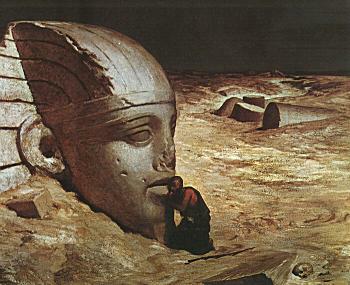
Listening to the Sphinx
Elihu Vedder
b. Feb. 26, 1836
_______________________
Double Alterity and the Global Historiography of Sexuality:
China, Europe, and the Emergence of
Sexuality as a Global Possibility [pdf]
Howard Hsueh-Hao Chiang
Abstract
The central problem that concerns my comparative/global historiographic analysis is this: under what conditions did various statements of sexuality come to claim the status of being scientifically comprehensible essentially, the status of being possible candidates of truth-and-falsehood? In the interest of situating this problem in a framework of translational economy and global circulation, I am equally interested in addressing the relationship of these conditions to geopolitical variability and the contours of temporality. To deal with the synchronic relationship between temporal and spatial change, in this paper I propose the concept of "double alterity". I argue that sexuality emerged as a global possibility at a critical conjuncture of double alterity in the nineteenth century, when the alterity of the temporal past and the alterity of the distanced Other converged to generate a new condition of possibility for certain statements of sexuality to claim the comprehensibility of a science. Accordingly, "double alterity" is a hybrid concept that merges Foucauldian claims about the history of Western sexuality with post-Saidian claims about the discursive function of the Orientalist discourse. Using this analytic rubric, I bring the geopolitical frameworks of colonialism and imperialism to bear on the study of the seemingly private domain of desire and the intimate in the context of China, Europe, and beyond.
E-pisteme
Issue 2: Volume 2(1), 2009 - Boundaries
_______________________

photo - mw

Library Bureau
Recorded experience: Statistical Service Division
1924
Lost Labor
Images of Vanished American Workers
1900-1980
_______________________
The Language of Looting
What "Nationalize the Banks" and the "Free Market" Really Mean in Today's Looking-Glass World
Michael Hudson
How is it that Alan Greenspan, free-market lobbyist for Wall Street, recently announced that he favored nationalization of America’s banks – and indeed, mainly the biggest and most powerful? Has the old disciple of Ayn Rand gone Red in the night? Surely not.
The answer is that the rhetoric of “free markets,” “nationalization” and even “socialism” (as in “socializing the losses”) has been turned into the language of deception to help the financial sector mobilize government power to support its own special privileges. Having undermined the economy at large, Wall Street’s public relations think tanks are now dismantling the language itself....(more)
_______________________

Out My Window
Robert Mann Gallery
Gail Albert Halaban
via gmtPlus9 (-15)
_______________________
Question and Echo
Spurious on Blanchot (and Jandek)
What questions do we ask into an oeuvre? What is allowed to echo there? Two boys lost their ball in deep grass on a French hillside. Following it, they discovered it had fallen into an entrance of a cave. Inside, carrying torches, they discovered great ochre coloured beasts on the walls in the flickering light: this was Lascaux where, thereafter, various theorist-adventurers would find there what they wanted, asking their question into the cave's echo and receiving their echoing question which they took for an answer.(....)
Some writers know to get out of the way of the work, to let it live. Know that the work belongs to darkness, that the ochre beasts should be discovered by the uncertain light of a reader's torch, and that there should no general illumination, no way of seeing the whole, and all at once.(....)
Dead, and away from the work. Dead, and retreating into darkness, to let the work be. To let it shine by the reader's torch and not according to light of his own pronouncements. Discretion, then; withdrawal - impressive to maintain, in the face of the media, a kind of negative celebrity, a void in place of a man. There is the work in the darkness that belongs to it. And the man about whom for a long time we knew nothing....(more)
_______________________
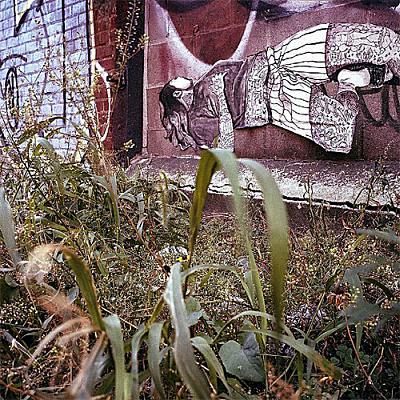
Lost Spaces, Found Gardens
Paul Raphaelson
_______________________
From "Mozart's Third Brain"
Göran Sonnevi
Translated from the Swedish by Rika Lesser
(....)
What takes place in this thinking substance? The play of the mind's
faculties, the dance, across the inner, shimmering surfaces
For me there was no limit For me there is no
limit, except at the instant of snapping, even were it
endlessly stretched We will meet in the silence, after the dance
What does the voice communicate? As if I never knew
in advance It comes with all its potentials
Invisible Out of its fold, foldings, a face peers
as if it were Harlequin-Mozart The great darkness of the eyes! Also
their smile Quick, friendly We can be like that too
My vision is now given to the Eye-Brain Yours, you who
look at me, out of your femininity, half turned away, almost with
your back to me So that we will not burn up? I hear
your voice It exists in the vast play of the voices, their light
What kind of movement up from death? Is such a thing possible at all?
A flame rises from the ashes, dances, offers itself, its body
in its moments of stillness, a prayer Coiling into itself
Unwinding again Returning to the ruins of silence
...(more)
Typo 7: Swedish Invasion
More from Mozart's Third Brain at Words Without Borders
_______________________
The Obama Code
George Lakoff
For the sake of unity, the President tends to express his moral vision indirectly. Like other self-aware and highly articulate speakers, he connects with his audience using what cognitive scientists call the “cognitive unconscious.” Speaking naturally, he lets his deepest ideas simply structure what he is saying. If you follow him, the deep ideas are communicated unconsciously and automatically. The Code is his most effective way to bring the country together around fundamental American values.
For supporters of the President, it is crucial to understand the Code in order to talk overtly about the old values our new president is communicating. It is necessary because tens of millions of Americans—both conservatives and progressives—don’t yet perceive the vital sea change that Obama is bringing about.
The word “code” can refer to a system of either communication or morality. President Obama has integrated the two. The Obama Code is both moral and linguistic at once. The President is using his enormous skills as a communicator to express a moral system. As he has said, budgets are moral documents. His economic program is tied to his moral system and is discussed in the Code, as are just about all of his other policies.
Behind the Obama Code are seven crucial intellectual moves that I believe are historically, practically, and cognitively appropriate, as well as politically astute. They are not all obvious, and jointly they may seem mysterious. That is why it is worth sorting them out one-by-one....(more)
via Stephen's Web ~ OLDaily
_______________________
 local landscape
Stefan Abrams
via Mrs. Deane

Swedish Schoolroom
Andrew Moore A Conversation with Andrew Moore
Conscientious
_______________________
from
A Year
John Latta
(....)
A filament (a thread,
coil’d within a bulb)
is one distillation of
starlight, earth-lash’d and
snug’d in by man’s
own terrible faulty progress.
“Isn’t it, golden boy?”
It’s all irreproachable fondling,
miasmic self-effacement, slough’d
down exponential lucre snatch’d
out under colossal stone
noses, a wink of
misdirection, and obedience to
a course mark’d by
debt and wrong-doing.
A new shape riotous
shilling a non-event.
...(more)
_______________________
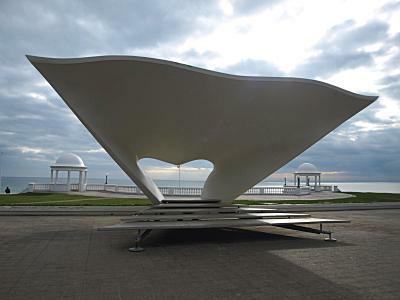
hastings and bexhill:
the television man and modernism on sea
infinite thØught
_______________________
Poems from Altered State - The New Polish Poetry
Edited by Rod Mengham, Tadeusz Pióro and Piotr Szymor.
Bird Bones
Edward Pasewicz
Traces, echoes, stains and tongues
mixed as in a conference centre.
See, the man in the shirt clutches
at his heart, lips turn to snow
and the index finger is a rose, a compass
like effusion, blood on skin and
he’s become a boat, drifting
into the delta and the river, as you know,
permits no dissimulation.
(....)
What shall we do without the bearded gent
who until now would let us in
to wander underground?
Bird song betrays us, and gestures,
those awkward attempts at repetition,
but after all we take it lightly,
jump, they shout, and we jump.
-
Translated by Tadeusz Pióro.
_______________________
Joseph Beuys: Transformer
UBUWEB Film & Video
This 60-minute documentary features avant-garde German artist Joseph Beuys and his unique sculpture art during a 1979 exhibit at the Guggenheim Museum in New York City. The tape features Beuys' work, interviews with him, and footage of him speaking before the patrons at his Guggenheim showing. The main feature of the video is Beuys telling a little of his own history -- how his life changed when the Russians shot down his German airplane during World War II, as well as his opinions on art, mankind, the state of the world, and some of his artistic inspirations. This documentary captures the world of an artist at the pinnacle of his fame. via Andrew Abb
_______________________

Misha and Vladimir,
Lake Baikal
Andrew Moore
_______________________
The Abyss Stares Back
Jim Kunstler
I suppose Mr. Obama is burdened with the knowledge that the economic truth is so much worse than he imagined back in November that there is simply nothing to do at this point except pretend to serve up a "tasting menu" of rescue plans in the hope that markets and mechanisms might be conned back into compliance with our wish keep getting something-for-nothing forever. FDR already used the fear of fear itself trope, so Mr. O is left with little more than displaying pluck and confidence in the face of overwhelming bad news.
The sad truth is that banking has become a Chinese fire drill -- a frantic act of futility -- as insolvent companies persist in covering up their losses in order to avoid the counter-party hell of credit default swaps that would ring the world's "game over" bell. This can only go on so long. All the chatter about "nationalizing" the banks really boils down to what kind of bankruptcy work-out will they be put through, how destructive will the process be, and how much of the pain can be shoved forward in time to people now in diapers and their descendants.
Among the questions that disturb the sleep of many casual observers is how come Mr. O doesn't get that the conventional process of economic growth -- based, as it was, on industrial expansion via revolving credit in a cheap-energy-resource era -- is over, and why does he keep invoking it at the podium? Dear Mr. President, you are presiding over an epochal contraction, not a pause in the growth epic. Your assignment is to manage that contraction in a way that does not lead to world war, civil disorder or both. Among other things, contraction means that all the activities of everyday life need to be downscaled including standards of living, ranges of commerce, and levels of governance. "Consumerism" is dead. Revolving credit is dead -- at least at the scale that became normal the last thirty years. The wealth of several future generations has already been spent and there is no equity left there to re-finance....(more)
_______________________

Abandoned church
Vologda
Andrew Moore
_______________________
Actual Interview with a Six-Year-Old
on the Topic of Flarf
The Flarflist Collective
jacket
Q: What if I told you that people don’t like Flarf?
A: Not many flarfs are left in dada world. Lots of the hunters shoot down flarfs for TV shows, because the dada kids can’t control their parents too well. So there aren’t too many flarfs left. When they are trying to shoot the flarfs down down, the flarfs just fall into a very bad sleep. They sleep until they write flarf....(more)
_______________________
The Wood-pile
Robert Frost
OUT walking in the frozen swamp one grey day
I paused and said, “I will turn back from here.
No, I will go on farther—and we shall see.”
The hard snow held me, save where now and then
One foot went down. The view was all in lines
Straight up and down of tall slim trees
Too much alike to mark or name a place by
So as to say for certain I was here
Or somewhere else: I was just far from home.
...(more)
_______________________
Poster poems: Walking
Billy Mills
_______________________
In My Own Recognizance
Ronald Sukenick
Gone is the aura of elite snobbism that once surrounded the avant-garde. Instead of a movement the avant-garde has become a matter of idiosyncratic practitioners interested in innovation.
You can't dictate style. What would the right style be?
The avant-garde is European; the underground is American. Elitist::oppositional.
Innovative fiction is not inherently better than any other kind of fiction. It's a genre like any other, and like any other there are mediocre examples as well as a few brilliant ones.
I personally am enamored of the traditional Canon but not interested in repeating it. My ways of avoiding it are through the practice of certain mental gymnastics, or, rarely, through the use of constrictive form as with the Oulipo group whom I consider creative cousins.
Mental gymnastics: ways of blocking the already formulated in pursuing the unformulated.
I try to write in that mental space of 30 seconds where the past claws at the future to produce what we call the present. That helps me get past the premeditated....(more)
98.6 a Novel Ronald Sukenick google books
Long Talking Bad Conditions Blues
Ronald Sukenick
google books
The Endless Short Story
Ronald Sukenick
google books
_______________________
Canada's Top 10 Digital Thinkers?
via Sebastien Paquet's Seb's Open Research, back after a two year hiatus.
via Stephen Downes at Stephen's Web ~ OLDaily
_______________________
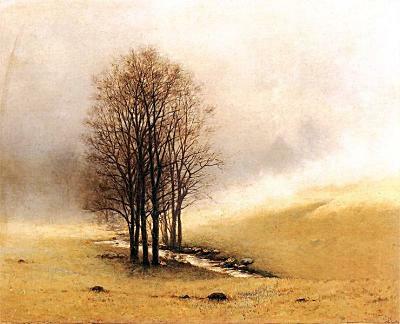 Springtime fog
Stanislaw Ignacy Witkiewicz
(Feb. 24, 1885 – Sept. 18, 1939) 1 2
_______________________
from
Response and Reconciliation
Octavio Paz
Sudden spring, a girl who wakes
on a green bed guarded by thorns;
tree of noon, heavy with oranges:
your tiny suns, fruits of cool fire,
summer gathers them in transparent baskets;
the fall is severe, its cold light
sharpens its knife against the red maples;
Januaries and Februaries: their beards are ice,
and their eyes sapphires that April liquefies,
the wave that rises, the wave that stretches out,
appearances-disappearances
on the circular road of the year.
All that we see, all that we forget,
the harp of the rain, the inscription of the lightning,
the hurried thoughts, reflections turned to birds,
the doubts of the path as it meanders,
the wailing of the wind
as it carves the faces of the mountains,
the moon on tiptoe over the lake,
the breezes in gardens, the throbbing of night,
the camps of stars on the burnt field,
the battle of reflections on the white salt flats,
the fountain and its monologue,
the held breath of outstretched night
and the river that entwines it, the pine under the evening star
and the waves, instant statues, on the sea,
the flock of clouds that the wind herds
through drowsy valleys, the peaks, the chasms,
time turned to rock, frozen eras,
time maker of roses and plutonium,
time that makes as it razes.
The ant, the elephant, the spider, and the sheep,
our strange world of terrestrial creatures
that are born, eat, kill, sleep, play, couple,
and somehow know that they die;
our world of humanity, far and near,
the animal with eyes in its hands
that tunnels through the past and examines the future,
with its histories and uncertainties,
the ecstasy of the saint, the sophisms of the evil,
the elation of lovers, their meetings, their contentions,
the insomnia of the old man counting his mistakes,
the criminal and the just, a double enigma,
the Father of the People, his crematory parks,
his forests of gallows and obelisks of skulls,
the victorious and the defeated,
the long sufferings and the one happy moment,
the builder of houses and the one who destroys them,
this paper where I write, letter by letter,
which you glance at with distracted eyes,
all of them and all of it, all
is the work of time that begins and ends.
...(more)
roo
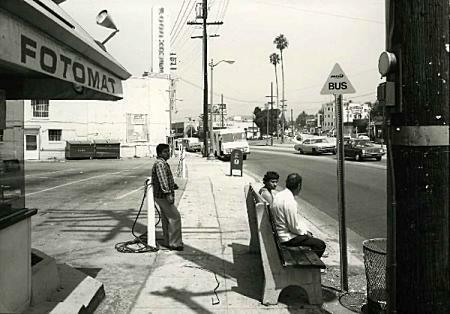
Anthony Hernandez
Christopher Grimes Gallery
.....................................................
Anthony Hernandez - "Phantoms and Dreams, Ghosts and Grit..."
Doug Rickard
AMERICANSUBURB X
The 1970’s photographs of Anthony Hernandez possess something stupendous, something glorious and lusciously strange… something that fleeting, or maybe some would say… “it’s hard to pin down”. Of course the aesthetic is godsmackingly gorgeous… nostalgia pounding off the pixel… a fountain of analog flaws jumping off of the page. But that is not it. Perhaps the something is a too complex, a feeling that can’t be described because if varies for each individual – hence the feeling is not constant but an ever changing chameleon, a phantom… or perhaps yes, it is a ghost, or perhaps the traces of the ghosts, the feelings that the bell bottom, bus riding, cement troddin, sideburn polyester wearin’ folks left when they went to and fro in a sun drenched, stark, smoggy city… the traces that existed decades ago and yet still exist in the shared heads of the memories, the speculations, in the shared legends of the one and only palm tree land… but the traces, we can still feel them right now, even as you read my words… they are remnants, they are here on our screen, and then it goes from there out, into you… ghost people, ghost cars, ghost buses, traces touching your insides, making you feel, making you feel them and their things… their empty scenes, vacant to stare at, empty to soak into your head, yours… and theirs, them dead, you sitting here, still feeling them and their dead, long gone places....(more)
_______________________

Anthony Hernandez
Christopher Grimes Gallery
_______________________
And Their Winter and Night in Disguise
George Oppen
The sea and a crescent strip of beach
Show between the service station and a deserted shack
A creek drains thru the beach
Forming a ditch
There is a discarded super-market cart in the ditch
That beach is the edge of a nation
There is something like shouting along the highway
A California shouting
On the long fast highway over the California mountains
Point Pedro
Its distant life
It is impossible the world should be either good or bad
If its colors are beautiful or if they are not beautiful
If parts of it taste good or if no parts of it taste good
It is as remarkable in one case as the other
As against this
We have suffered fear, we know something of fear
And of humiliation mounting to horror
The world above the edge of the foxhole belongs to the flying bullets, leaden superbeings
For the men grovelling in the foxhole danger, danger in being drawn to them
These little dumps
The poem is about them
...(more)
George Oppen feature
Editor: Thomas Devaney jacket
_______________________
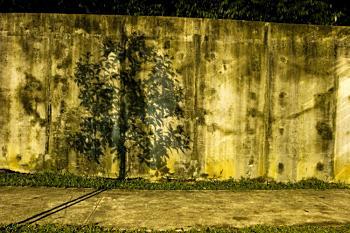
Shadows
Yaohong Asian Photography Blog
_______________________
What I Remember The Writers Telling Me
When I Was Young
William Meredith
(for Muriel Rukeyser)
Look hard at the world, they said --
generously, if you can
manage that, but hard. To see
the extraordinary data, you
have to distance yourself a
little, utterly. Learn the
right words for the umpteen kinds
of trouble that you'll see,
avoiding elevated
generics like misery,
wretchedness. And find yourself
a like spectrum of exact
terms for joy, some of them
archaic, but all useful.
Sometimes when they spoke to me I
could feel their own purposes
gathering. Language, the dark-
haired woman said once, is like
water-color, it blots easily,
you've got to know what you're
after, and get it on quickly.
Everything gets watered
sooner or later with tears,
she said, your own or other
people's. The contrasts want to
run together and must not be
allowed to. They're what you
see with. Keep your word-hoard dry.
Partial Accounts
William Meredith
_______________________
To Ramble
Tom Hodgkinson
It's a shame that the noble word 'pedestrian' has come to be used in a pejorative sense. 'Terribly pedestrian' is how we dismiss a piece of creative work if we want to convey the idea that it is humdrum, ordinary, unspectacular. It's as if the humble ramble has become tedious and boring in comparison with flashier, faster modes of transport like trains, planes and automobiles. But in the pedestrian, the wanderer, the rambler, the flâneur can be found the soul of the idler. The pedestrian is the highest and most mighty of beings; walking for pleasure, observing but not interfering, happy in the company of his own mind.(....)
... the act of ambling is an act of revolt. It is a statement against bourgeois values, against goal-centred living, busy-ness, bustle, toil and trouble. For the creative spirit, the act of walking harmonises work and play. For Benjamin, "the idleness of the flâneur is a demonstration against the division of labour."(....)
Walking well is a mental state as much as a physical one. How to walk? One of Benjamin's quotes in Arcades stresses the importance of keeping your eyes open. "To walk out of your front door as if you've just arrived from a foreign country; to discover the world in which you already live; to begin the day as if you've just gotten off the boat from Singapore and have never seen your own doormat or the people on the landing … it is this that reveals the humanity before you, unknown until now."...(more)
Tom Hodgkinson interviewed at Mother Jones and 3 A.M. Magazine
How to Be Idle Tom Hodgkinson amazon
via tawny grammar
_______________________
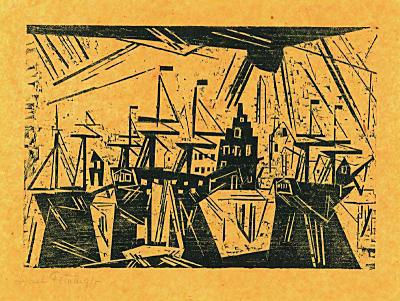
harbor wharf
1918
Lyonel Feininger
1871-1956
_______________________
Dense Photography
Matthew Summers-Sparks
the morning news
As I framed what would become my mildly groundbreaking photo, I realized that, along with the Abbey, part of the Houses of Parliament was visible in the camera’s screen. If I shifted a couple of paces to the right I could also include Big Ben and even part of the London Eye, the huge Ferris wheel on the opposite side of the Thames. By stepping into Tothill Street, I could cram an iconic British phone booth into the shot, as well as a double-decker bus and a London taxi, which rolled into the scene every minute or so, and the corner of the Methodist Central Hall Westminster—the building where, in 1946, the U.N. General Assembly first met. I snapped the photo.
What I captured isn’t the most aesthetically pleasing photo; rather, it was the first example of my new approach to taking pictures, which I’ve taken to calling “dense photography.” Rather than a simple shot of the Abbey standing stark against a night sky, I had the Abbey standing stark against a night sky, plus the Houses of Parliament, Big Ben, the London Eye, a double-decker bus, a London taxi, and the birthplace of the United Nations mashed into one glorious shot.
As mildly revolutionary as this technique might be, I have the sense I stumbled upon it too late....(more)
_______________________
Daria Sukhovei
Tr. Peter Golub
silent are acacia bushes
to themselves radio stations sing
all the spiderworts are blooming
...
and about those spiderworts
people say they are quite noxious
enervate you by the truckload
,
and I don’t have that kind of energy
not even a glass of it
not a glass of something for a bit of it
,
I’ve got about a tea spoon which lasts an hour
when a day’s worth is required
,
and if you mix over an hour
in the general complexity
mix beat lick
amortization will considerably exceed
the general scheme
...
bah there’s really not a spiderwort left
not one
they desiccated when I was in school
learning
...
though in reality it’s not like that
they desiccated when I went to school
through the places under snow
unfinished undeveloped houses ...(more)
New Russian Poetry Featureedited by Peter and Tatyana Golub jacket
_______________________
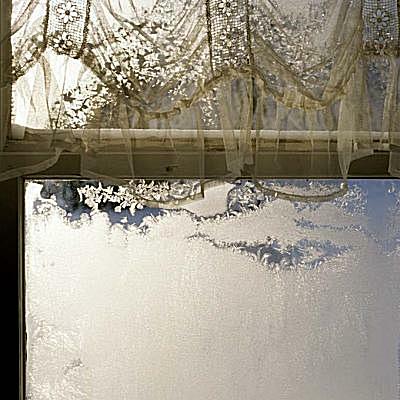
Susanne Katzenberg
_______________________
I tie my Hat— I crease my Shawl
Emily Dickinson
I tie my Hat—I crease my Shawl—
Life's little duties do—precisely—
As the very least
Were infinite—to me—
I put new Blossoms in the Glass—
And throw the old—away—
I push a petal from my Gown
That anchored there—I weigh
The time 'twill be till six o'clock
I have so much to do—
And yet—Existence—some way back—
Stopped—struck—my ticking—through—
We cannot put Ourself away
As a completed Man
Or Woman—When the Errand's done
We came to Flesh—upon—
There may be—Miles on Miles of Nought—
Of Action—sicker far—
To simulate—is stinging work—
To cover what we are
From Science—and from Surgery—
Too Telescopic Eyes
To bear on us unshaded—
For their—sake—not for Ours—
'Twould start them—
We—could tremble—
But since we got a Bomb—
And held it in our Bosom—
Nay—Hold it—it is calm—
Therefore—we do life's labor—
Though life's Reward—be done—
With scrupulous exactness—
To hold our Senses—on—
posted by Jim Culleny at 3quarksdaily
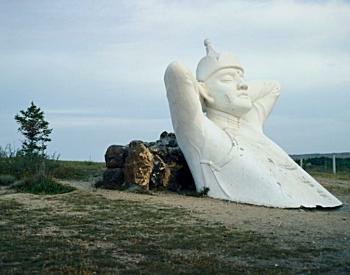
The Earth
Li Wei
via Heading East
_______________________
Laissez-Faire Capitalism Has Failed
The financial crisis lays bare the weakness of the Anglo-Saxon model.
Nouriel Roubini
forbes
There is the failure of ideas--such as the "efficient market hypothesis," which deluded its believers about the absence of market failures such as asset bubbles; the "rational expectations" paradigm that clashes with the insights of behavioral economics and finance; and the "self-regulation of markets and institutions" that clashes with the classical agency problems in corporate governance--that are themselves exacerbated in financial companies by the greater degree of asymmetric information. For example, how can a chief executive or a board monitor the risk taking of thousands of separate profit and loss accounts? Then there are the distortions of compensation paid to bankers and traders.(....)
It is clear that the Anglo-Saxon model of supervision and regulation of the financial system has failed. It relied on several factors: self-regulation that, in effect, meant no regulation; market discipline that does not exist when there is euphoria and irrational exuberance; and internal risk-management models that fail because, as a former chief executive of Citigroup put it, when the music is playing, you've got to stand up and dance.
...(more)
via High Low and in Between
_______________________

Personal Geography Patrick Shanahan
_______________________
The Words
Rebecca Rosenblum
Canadian Notes & Queries
Colleen
Colleen shuffled the God pamphlets in her lap while Mr. Andrews chalked square yellow letters on the board. Boring. The white-paper one was cheaply printed: the yellows did not line up with the reds or blues, so Jesus was all halo, no body. Inside was just a boring list of Sunday school and Bible-study classes. The glossier one had pictures of candles and sheet music, a paragraph about the joy of faith, a couple things that sounded like cheers. Even better, no church address where her father could go and ask questions. Not that he would.
“Ok, people, focused attention…” Mr. Andrews dropped the chalk into his sleeve. In her notebook Colleen wrote, Bible study group. Leader: Drew. Then she crossed out group and wrote cell, like terrorists. Scarier.
Mr. Andrews was saying, “I hope you’ll really get involved with this project, come to see poetry not as words on the page, but reality interpreted in words.”
Colleen wrote: The leader will interpret the reality of God’s words.
“Well, that’s the hour. Thanks, guys.”
Colleen stayed in her seat, waiting for Andrews to skedaddle out. She stared at her blue-ink, red-underline title: Mindfuck. Date in the upper righthand corner.
She flicked through the Bible she’d got out of the library. She was worried, a little, about accidentally brainwashing herself. Not very worried, but she’d watched talk shows. She knew about Mormon harems and Catholic perverts, kids going naked on compounds in Arizona, parents selling their houses to pay for deprogrammers....(more)
Canadian Notes & Queries
_______________________

A Momentary Presence Patrick Shanahan
_______________________
Snake Tunnels in Taliban Territory
Bryan Finok
Subtopia
... as a military fossil, Afghanistan is an epic imprint of human history’s ongoing engagement with the densest contours of the terrestrial, where ancient culture has been embedded in the geologic timescales of conflict space for centuries. The country’s story could probably be entirely retold in the evolutionary compressions and picture carvings of its vast mineral deposits alone. If Afghanistan were a book, its pages would be composed of ancient lithic space, there would be chapters on mythological caves, karezi canals and the more egregious military archeology of centuries worth of warfare. Dust-bound stories captured in the petrified pages of Asian history, cultural memories scrawled in open a closed fissures; a complete archive of Afghanistan’s struggles with itself and its neighbors stacked upon one another in alternating layers of sediment violence and mineralized calm.(....)
We see it over an over again, the tunnel as the perpetual thorn in military superpower’s side. It crops up where empire is not looking, and then even in the face of overwhelming authority it pushes through and succeeds still undetected well below the technological prowess of the state. Over and over again we see it is the tunnel that manages to survive. And that alone – that a single spatial form could persist even in today’s military climate – is just unbelievably fascinating to me.
I’ll be picking up more on this in the future, the underground resiliency of places from Gaza to Nogales, Kowloon to Baghdad, Lebanon, Canada, just to name a few; the tunnel as the raw liquid-space of superpower’s subversion, globalization’s Achilles heal, this perennial undoing of the colonial landscape, etc....(more)
_______________________
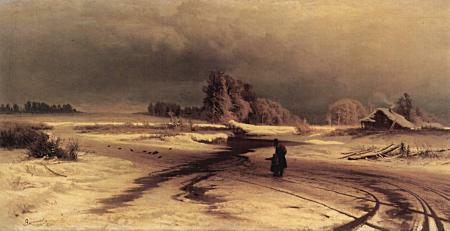
Thaw
Feodor Vasilyev
1850 - 1873
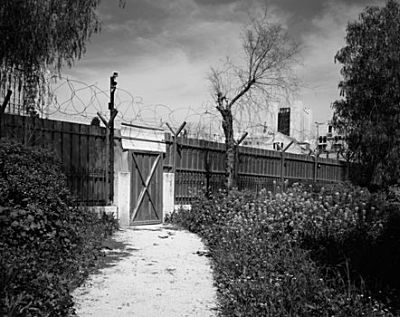
Disintegration of a Revived Nation
Yaniv Waissa
via
_______________________
The Matter of Past-Loving London
A report on the purported delivery of the INS Declaration on Inauthenticity-office comedy Maurice Blanchot and Tommy Cooper would've loved to death.
by Ben Street & the International Necronautical Society
Triple Canopy
Ninety-nine years on, the International Necronautical Society—a group dedicated to the inauthentic, the reproduced, the reconstructed—is launching its manifesto from Tate Britain’s Clore Auditorium, part of the gallery’s 1987 extension, designed by James Stirling and Michael Wilford. Though hailed as a masterpiece when it debuted, it is now but another unloved bit of institutional sterility, all caulked glass, hot-colored plastic, and snarky gables—the perfect site for a declaration mining “the experience of failed transcendence.”
At the back of the stage, there is a large screen showing a PowerPoint presentation in the sans-serif font of the international conglomerate: The INS logo swims and dissolves as “Networking Space, Constructing Craft” crawls across the screen. Below it, two faux-bois lecterns in jagged double-inverted-triangle shapes stand, empty, about eight feet apart, with the names of the speakers—INS General Secretary Tom McCarthy and INS Chief Philosopher Simon Critchley—printed on metal plaques in that same corporate font, the INS logo set in the corner.
Everything is like something: the airports-and-hospitals font, the cordoned-off press area and “Reserved” stickers on the front two rows, the notebooks-out sense of imminent interest: Steve Jobs announcing a microscopic iThing, a bank declaring a name change, a policy being launched; someone resigning, someone being promoted. The International Necronautical Society’s commitment to bureaucratic procedure is obsessive in its detail and methodical to a fault: INS documents are studded with footnotes and parenthetical exegesis. The Declaration is both a declaration in the tradition of Marinetti’s Manifesto Against Past-Loving Venice and the documentation of what a declaration might be like (a “mapping,” in the INS’s favored nautical and navigational terminology). The “craft” of the PowerPoint is, then, a literal one, and the flotsam of event management—each logistical flourish code for “This really happened,” like a saintly shinbone—has become the latitude and longitude of a voyage into the unknown. ...(more)
Triple Canopy Issue #5via if:book
_______________________
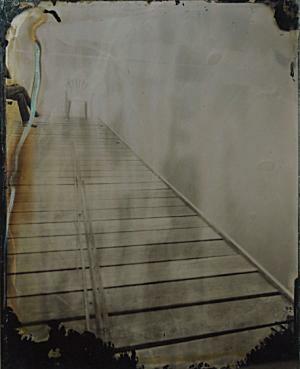
Michelle Kloehn
via
_______________________
Epitaph on a Tyrant
W. H. Auden
21 February 1907 - 29 September 1973
Perfection, of a kind, was what he was after,
And the poetry he invented was easy to understand;
He knew human folly like the back of his hand,
And was greatly interested in armies and fleets;
When he laughed, respectable senators burst with laughter,
And when he cried the little children died in the streets.
_______________________
Mississippi Goddamn
Nina Simone
February 21, 1933 - April 21, 2003
......
Where am I going
What am I doing
I don't know I don't know
Just try to do your very best
Stand up be counted with all the rest
Cos everybody knows about Mississippi Goddam
I bet you thought
I was kidding didn't you
Picket lines school boycots
They try to say it's a communist plot
All I want is equality
For my sister my brother my people and me
Yes you lied to me all these years
You told me to wash and clean my ears
And talk real fine just like a lady
And you'd stop calling me Sister Sady
Oh but this whole country is full of lies
You're all gonna die and die like flies
I don't trust you anymore
You keep on saying go slow go slow
But that's just the trouble too slow
Desegregation too slow
Mass participation too slow
Unification too slow
Do things gradually too slow
Will bring more tragedy too slow
Why don't you see it why don't you feel it
I don't know I don't know
You don't have to live next to me
Just give me my equality
And everybody knows about Mississippi
Everybody knows about Alabama
Everybody knows about Mississippi Goddam
...(more)
_______________________
Talk about trillions of dollars has become so commonplace that billions seem minuscule -- even though a billion minutes ago Plutarch (46-120 A.D.) was alive --
- George F. Will
via
_______________________
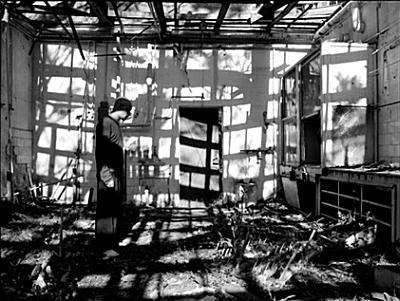
The Storm Still Rages Inside
Yaniv Waissa
_______________________
from
The Eighth Elegy
Rainer Maria Rilke
Translated by Alison Croggon
the drunken boat
We have never, not for a single day,
the pure space before us, in which flowers
unendingly burst open. It is always world
and never nowhere without no:
that pureness, that unwatched, which one breathes and
endlessly knows and never wants. But a child
might lose himself inside the quiet and become
shaken. Or someone dies and is.
..................
And yet in the wakeful warm animal
is the weight and sorrow of a huge dejection.
For it also clings to what often
overwhelms us — a memory,
that what we thrust after, was formerly
nearer, truer and its connection
endlessly tender. Here all is distance,
and there was breath. After the first home
the second is ambiguous and windy.
..................
And we: onlookers, always, over all,
interested in everything, and never looking out!
Overfills us. We order. It decays.
We order again and ourselves decay.
Who turned us thus around, so we,
no matter what, have the pose
of one who is departing? As he who on
the last hill which still shows
his whole valley, will turn, halt, pause —
so we live, forever taking leave.
...(more)
_______________________

Hiding the Hidden
Anders Krisar 1 2
_______________________
Marsh Hawk Review, Spring 2009
edited by Thomas Fink
No Remainder
Tom Beckett
Space into
The effect.
One isn't
A set.
It's sketchier
Than that.
To blank
So much.
The present
Is static.
Withholding oneself
In language.
...(more) via Mark Young
_______________________
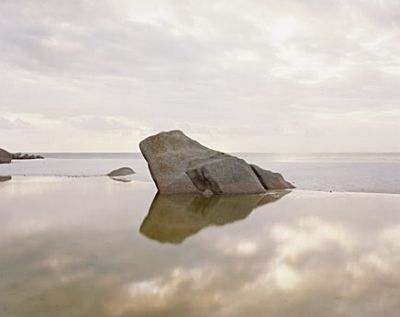
Chords
Anders Krisar via
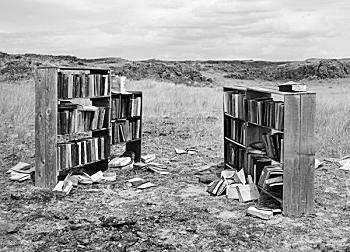 The Library
Chris Engman
2005
_______________________
Abulafia
Pawel Huelle
Translated from the Polish by Antonia Lloyd-Jones
words without borders
His only real life was his memories. But he could not summon them up the way you take photographs from an album. They came according to a logic of their own, and disappeared in just the same way. Sometimes this caused him even greater pain, as the image of his mother, or just of the field road leading across the dunes and pine groves by the sea suddenly faded and vanished.(....)
In the end he decided to have one more try. Sentence by sentence, he would write out the book of his life. It must be short and ascetic, not as complicated as the elegies, so that his memory could open it every day. He discovered a new method for this. Before darkness fell in his cell, he noted down the last sentence added to his book in shorthand. The sand on the dirt floor came in useful.
M f, e d a a, e m a c s i S, etched out with his finger, meant my father, ever drunk and angry, enrolled me at cadet school in Stolpen. In the morning, before the guard brought the food and water, he read back the sentence aloud, after reciting all the previous ones from memory. It brought him great relief. From then on the images of the past no longer came to him randomly and painfully: now he had control of them, he could call them up and set them aside at his own desire. What the wordy elegies did not contain was brought by the stark, rhythmic prose....(more)
_______________________
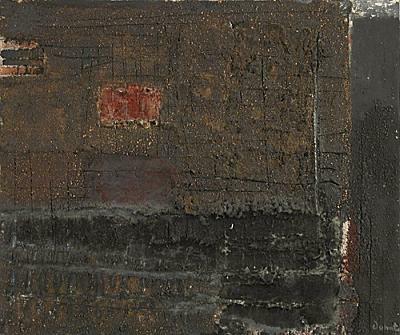
Enrico Donati
b. Feb. 19, 1909
_______________________
Mistaken Indemnities
Jane Joritz-Nakagawa
jacket
Although I agree with Juliana Spahr who has said poetry helps her think, since it helps me think, too, and with Bernstein and others for positing poetry as a possible alternative to deception — I no more want to champion feeling as thought’s backwards cousin, than I want to deny (at least not too often) my need for occasional, even frequent, comforting.
Poetry as entryway to suppressed or undiscovered thoughts/feelings; poets may feel (think) their poems accommodate complex thoughts / feelings better than relatively simplistic (if not deceptive) quasi-linear prose. (Writing in order to get rid of memory / Forget in order to remember and then forget what we’ve remembered.) Who cares if our memories or poems are material, physiological, metaphysical, psychological, fake or real? As somebody said about John Waters’ films, the more fake, the more real. Let’s go for “the painfully impossible in the human heart” [brain]. ...(more)
_______________________
Playful Restraint
Henry Gould
The Plumbline School
... poetry does aspire to be a thing-in-itself - yet also, somehow, to be rooted in that which it is not. So if I were to put it in more of a nutshell, I might say that the Plumbline School is about (1) recognizing - & acknowledging - what is beyond poetry : and (2) attempting to orient both poetry-making & criticism toward that chastening (or inspiring, depending how you take it) recognition.
In other words, we of the Plumbline School are going to register an awareness of these differences, these differential realities - and seek ways to balance them. Because poetry that (whether due to style, ideology, professional place-seeking, or some other reason) turns its back on what is non-poetry, eventually dries up & withers away. ...(more)
_______________________
Hippies, Fascists and a State of Play
Joseph Duemer
The Plumbline School
The plumbline, even when it is perfectly still, only does its job because it is free to move; conversely, it is constrained by the laws of physics to come to rest over a point of equilibrium, drawing a line straight through the center of the earth. In a physical or mechanical system, we say there is "play" if there is a bit of slack or looseness, enough to allow some unpredictable motion without becoming completely random; if there is no play in the system, it locks up. So this is just one more metaphor for the middle way, but a useful one for me. At my best, such an approach governs my approach to daily life, as well as to poetry. The state of play is akin to what a Buddhist might simply call being awake. ...(more)
_______________________
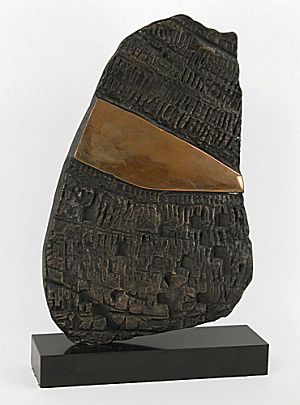
walking stone
Enrico Donati _______________________
from
hanging from the sky
kari edwards
(1954 - 2006)
I only keep company with coffee and
children who run with razors, but you have to love
them though, both take good photographs, go with
sugared almonds and christening. I wonder, what it
would be like to say: you have five months to live,
or have it said to you, as I just did? you have five
months to live. would you wait an hour in the
trenches with clenched iron fist idioms or what?
my step father, who was neither my father nor my
stepfather, no, it was someone I met who was
plowing a plot of land, plodding listlessly behind
their elephantine ox, a fancy dresser, a bit dismal
and self contained. I would listen with one ear. what
else could I do, the other only hears misfortune. the
owl falls silent. there is and awkwardness. something
brushes past some bushes. they are running faster
then I expected. it's draining my jetty like a suffering
infinity held tight by personal panic. without waiting
in line, I look up personal accounts of a special kind
of vampire. there are volumes on them; how
to empty their soul and spoil their affairs. the rest
huddle in darkness and remain there. the noise of the
chain. an indescribably delicate noise. it didn't like
the adverbs I just used. that is a warning unto itself.
this is fantastic, I whisper, so no one hears me. you
hear me because you're really here now. it starts to
rain. they are now they, and they are snatching
invisible things. I wander wildly from
disappointment to holes. what is the meaning of this?
having been blue for charity
kari edwards
BlazeVOX
_______________________
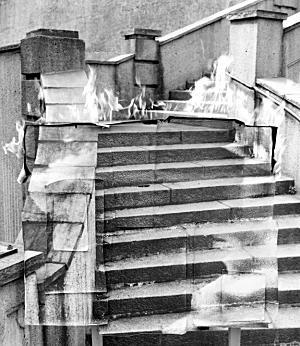
The Consummation
Chris Engman
_______________________
The Mortgaged Heart
Carson McCullers
February 19, 1917 - September 29, 1967
The dead demand a double vision. A furthered zone,
Ghostly decision of apportionment. For the dead can claim
The lover's senses, the mortgaged heart.
Watch twice the orchard blossoms in gray rain
And to the cold rose skies bring twin surprise.
Endure each summons once, and once again;
Experience multiplied by two--the duty recognized.
Instruct the quivering spirit, instant nerve
To schizophrenic master serve,
Or like a homeless Doppelgänger
Blind love might wander.
The mortgage of the dead is known.
Prepare the cherished wreath, the garland door.
But the secluded ash, the humble bone--
Do the dead know?
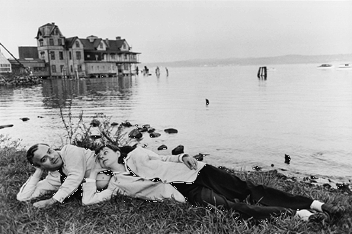
Carson McCullers
and
George Davis
Henri Cartier-Bresson
1946 The Carson McCullers Project
The Heart is a Lonely Hunter
Carson McCullers
google books _______________________
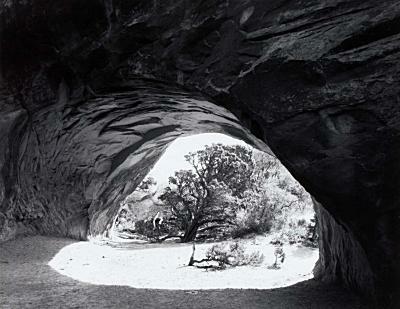
Robert Walch
Smithsonian
_______________________
Skinny Dipping in Reality
A coot's account of the great hippy LSD enlightenment search party
Joe Bageant
On the back of my eyelids spun a great wheel of existence, turning both ways simultaneously generating an unearthly mournful chant that seemed to be composed of every human voice on earth. It rose in some unknown universal tongue singing, "Wheel of life, wheel of death, Bangladesh, Bangladesh. Wheel of life, wheel of death, Bangaladesh, Bangaladesh." Millions of starving faces, young men, girls, old men, babies, crones, materialized in uncountable swarms, each face transfigured by some unnamable mutual understanding that I could not share. Then they atomized, leaving the room filled with the scent of wood smoke, shit and citrus blossoms (an odor I would instantly recognize decades later in poverty stricken Central American villages.)
No words can describe an LSD trip, but let me say that at the end of this one, I sat down and cried. For happiness. My deepest hope and suspicion, the one to which I dared not cling, had been confirmed. Life could indeed be significant, piercing and meaningful.
(....)
By no means am I an adept at crazy wisdom, thus I am sure thousands of folks sitting zazen in Boulder and San Francisco are livid at my sloppy explanation and less than deeply dedicated application of its principles. "Using crazy wisdom as an excuse to escape the discipline of Buddhism," is the usual charge. Which is much the same discipline ridden thinking as that of my Baptist-Pentecostal boyhood. Lawdy Miss Claudy, the American system instills a psycho-sexual love of discipline in all of us. No sex in the park bushes, no marijuana for Americans, but rather debt slavery and airport cavity searches by direct orders from the Christian police court Yaweh, whose face is now the Department of Homeland Security. It all comes down to just how much discipline is the right amount for an individual. A thirsty man needs but one drink of water to continue his journey, not the whole tank. Drinking the tank not only halts the journey, but in all likelihood kills the traveler. At any rate, as the years go by, what I take or mistake to be crazy wisdom continuously opens inner doors, even given my poor discipline (and small intermittent doses of it at that).(....)
All these years later I am beginning to understand the effect living for a decade or so in a genuinely free time and place had on my life. Thanks to an ongoing a ttempt to understanding human consciousness, everything has changed over time. Yet nothing has changed at all, except my attitude toward everything. And yes, LSD had everything to do with it. When it comes to rewiring one's own neuro-circuitry toward ecstatic understanding and perception and playful wisdom, and real compassion, LSD and Buddhism can certainly jump start the awakening. Paradoxically, that awakening is to a dream. You come to see very clearly that the "It is the dream that is dreaming the dreamer." Such liberating insights are big as stars. And like Mad Dog says, "You don't knock down stars with a bee bee gun."...(more)
_______________________
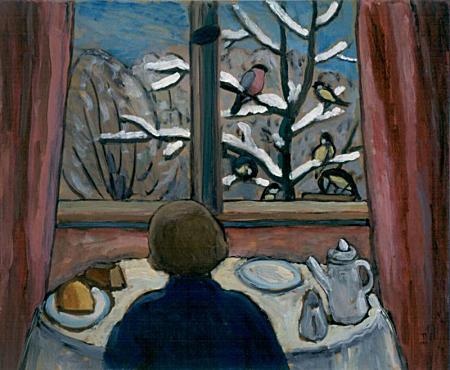
Breakfast of the Birds
Gabriele Münter
1934
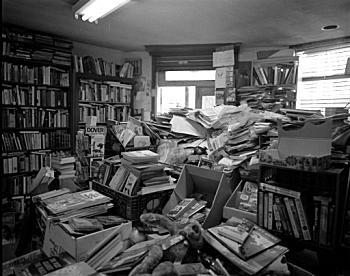
Used Book Store
Raul Gutierrez
Heading East
_______________________
Bookshop Memories
George Orwell
When I worked in a second-hand bookshop — so easily pictured, if you don’t work in one, as a kind of paradise where charming old gentlemen browse eternally among calf-bound folios — the thing that chiefly struck me was the rarity of really bookish people. Our shop had an exceptionally interesting stock, yet I doubt whether ten per cent of our customers knew a good book from a bad one. First edition snobs were much commoner than lovers of literature, but oriental students haggling over cheap textbooks were commoner still, and vague-minded women looking for birthday presents for their nephews were commonest of all.(...)
Like most second-hand bookshops we had various sidelines. We sold second-hand typewriters, for instance, and also stamps — used stamps, I mean. Stamp-collectors are a strange, silent, fish-like breed, of all ages, but only of the male sex; women, apparently, fail to see the peculiar charm of gumming bits of coloured paper into albums. We also sold sixpenny horoscopes compiled by somebody who claimed to have foretold the Japanese earthquake. They were in sealed envelopes and I never opened one of them myself, but the people who bought them often came back and told us how ‘true’ their horoscopes had been. (Doubtless any horoscope seems ‘true’ if it tells you that you are highly attractive to the opposite sex and your worst fault is generosity.) We did a good deal of business in children’s books, chiefly ‘remainders’. Modern books for children are rather horrible things, especially when you see them in the mass. Personally I would sooner give a child a copy of Petrenius Arbiter than Peter Pan, but even Barrie seems manly and wholesome compared with some of his later imitators. At Christmas time we spent a feverish ten days struggling with Christmas cards and calendars, which are tiresome things to sell but good business while the season lasts. It used to interest me to see the brutal cynicism with which Christian sentiment is exploited. The touts from the Christmas card firms used to come round with their catalogues as early as June. A phrase from one of their invoices sticks in my memory. It was: ‘2 doz. Infant Jesus with rabbits’.(...)
the real reason why I should not like to be in the book trade for life is that while I was in it I lost my love of books. A bookseller has to tell lies about books, and that gives him a distaste for them; still worse is the fact that he is constantly dusting them and hauling them to and fro. There was a time when I really did love books — loved the sight and smell and feel of them, I mean, at least if they were fifty or more years old. Nothing pleased me quite so much as to buy a job lot of them for a shilling at a country auction. There is a peculiar flavour about the battered unexpected books you pick up in that kind of collection: minor eighteenth-century poets, out-of-date gazeteers, odd volumes of forgotten novels, bound numbers of ladies’ magazines of the sixties. For casual reading — in your bath, for instance, or late at night when you are too tired to go to bed, or in the odd quarter of an hour before lunch — there is nothing to touch a back number of the Girl’s Own Paper. But as soon as I went to work in the bookshop I stopped buying books. Seen in the mass, five or ten thousand at a time, books were boring and even slightly sickening. Nowadays I do buy one occasionally, but only if it is a book that I want to read and can’t borrow, and I never buy junk. The sweet smell of decaying paper appeals to me no longer. It is too closely associated in my mind with paranoiac customers and dead bluebottles....(more)
_______________________

detail
Pietro Ciafferi
(1600-54)
from a series of scans provided by misteraitch at Giornale Nuovo
_______________________
less time
André Breton
Less time than it takes to say it, less tears than it takes to die; I've taken account of everything, there you have it. I've made a census of the stones, they are as numerous as my fingers and some others; I've distributed some pamphlets to the plants, but not all were willing to accpet them. I've kept company with music for a second only and now I no longer know what to think of suicide, for if I ever want to part from myself, the exit is on this side and, I add mischievously, the entrance, the re-entrance is on the other. You see what you still have to do.
Hours, grief, I don't keep a reasonable account of them; I'm alone, I look out of the window; there is no passerby, or rather no one passes (underline passes). You don't know this man? It's Mr. Same. May I introduce Madam Madam? And their children. Then I turn back on my steps, my steps turn back too, but I don't know exactly what they turn back on. I consult a schedule; the names of the towns have been replaced by the names of people who have been quite close to me. Shall I go to A, return to B, change at X? Yes, of course I'll change at X.
Provided I don't miss the connection with boredom! There we are: boredom, beautiful parallels, ah! how beautiful the parallels are under God's perpendicular.
_______________________

André Breton
Feb 19, 1896 – Sep 28, 1966
photo by Man Ray
c. 1930
André Breton: Selections
edited by Mark Polizzotti
google books
Manifestoes of Surrealism
André Breton
Translated by Richard Seaver, Helen Lane
google books
André Breton: The Power of Language
edited by Ramona Fotiade
google books
Two sections from The Air of the Water
André Breton
translated by Bill Zavatsky and Zack Rogow .....................................................
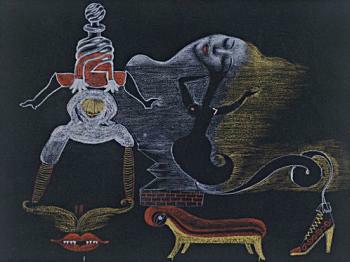
Cadavre Exquis
André Breton
with Valentine Hugo, Tristan Tzara
and Greta Knutson
.....................................................
'André Breton,' Prose-poems on the death of Breton [pdf]
Jean-Luc Nancy
Translated by Michael-Stone Richards
Oblivion flows back to its source, and our boredom turns light in the liquid name of André Breton where, with its silvered sheets, its droplets of mercury, it slips and roles on the light leaves of our pages.
What should it matter that winter may have frozen this source? Beneath the glassy ice the black stones shine – open mineral heart, beautiful dominion of no-possession. About it, the sand is penetrated by the dream of time-pieces, and there right to the thaw, fish make love.
Beneath the glassy ice, we are looked at, recalled. The century’s weight bears the shadowed claw: only our terrors and feasts are pierced, the secret spasm of our failing hand. Faced out, disfigured, by the whip, the tamanoir and the uncultured rose.(....)
Gentler, more implacable, he shines beneath the earth amidst its forest of mandragoras, at the nadir of our hopes. The least hint of our steps wakens him; the least of our missteps triggers the ringing beneath the briar and the mushrooms of his laughter with silver folds. And when we lay this body down, arms outstretched, through the fields, over the tar of cities, there he is who pierces our side, he through whose earth-spring wounds and traps blossom and flower.
In order to invent the day, and all that invents itself, his cloud-filled fingers make us leap into rings of fire. Faithful dance where shall burn the too transparent skin.
Upon our calcinated bones mounts a greasy pole: imagination heaven-sent.
In the morning of his death, cattle and books are marked. There is no longer time to doubt any
part of his dream. In the next night fall, our women will read the name of André Breton close to
their stomachs, against these hips where the unlettered transport their children. .....................................................
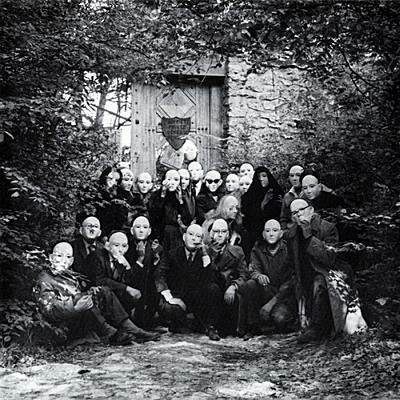
Breton et al the gate of the Désert
Photo by Denise Bellon
Scanned from Diana Ketcham, Le Désert de Retz, 1997
flickr
_______________________
Jonathan Littell on reading Maurice Blanchot
translated by Charlotte Mandell
This Space
Write about Blanchot, I am asked – or with him, or alongside him, or against him, it doesn’t matter. A difficult task, he himself would have said. All the more so since the problem immediately arises: how to write in the wake of this thinking without being carried away by its language? No one, to my knowledge, has managed it (except perhaps Foucault, Levinas: frightening predecessors). Well, let us try, even if it means taking that risk.
So what is this reading that Maurice Blanchot invites us to enact here, at once light and serious, a "joyful, wild dance," fundamental (founding the work) in its very insouciance? The first thing one could say about it is that it seems to us inseparable from his conception of writing as experience. "The story [le récit] is not the relation of the event, but that event itself," he wrote around the same time (in "The Song of the Sirens," reprinted in The Book to Come). Writing does not describe, does not relate, does not signify, it does not represent a thing, existing in the world of men or even only in the world of the imagination; it is neither more nor less than "the test of its own experience" (Blanchot again, I forget where, unless it's Bataille – so indistinguishable is their thinking on this point), the faithful account of what happened at that moment, the moment when the one who, seized by the desire to write, sat down in front of a blank piece of paper and began putting language onto it. It's not that the text that results from this experience – poem, story, novel – is deprived of meaning, is not shot through with elements referring to the reality of life; rather it's that these elements function (to use a comparison that Blanchot would no doubt have discreetly avoided) like what Freud called the manifest content of dreams: the rags of reality they cloak themselves with so as both to manifest and veil their truth, their very reality. Thus, if writing is related to truth – and it certainly is, it has to be, or else not be at all, or in any case fall outside of the realm we designate by that mysterious word, literature – it is not by way of knowledge. Literary writing does not explain, does not teach: it simply offers the presence of its own mystery, its own experience, in its absence of explanation, thus inviting not some illusory "understanding" ("Reading either falls short of understanding or overshoots it," writes Blanchot), but precisely a reading....(more)
Charlotte Mandell
_______________________

Suginami 12
James Luckett
Suginami
a book by James Luckett
blurb
photographs from Suginami on Flickr
"Suginami is one of the 23 'ku' or 'wards' of Tokyo, an area of the city where I lived for five years and where nearly all the photographs in the book were made. For me the photographs are not intended necessarily as a document of a specific place or time. Rather the photographs explore the ways the world can fit into the edges of a frame, the transformation of light inside the dark box of the camera, and the space of discovery between the viewfinder and the eye."
.....................................................

Suginami 58
James Luckett
.....................................................
One Thing Done Two Ways:
Elijah Gowin and James Luckett on Making a Book
Stacy Oborn at her The Space In Between
James Luckett:
... so I starting thinking about photography again, as an area where I might be able to do something more than be competent. So during that last year living in Tokyo, walking the dog, I took along with me a little digital point and shoot and began learning to see again.(....)
... this book is very personal. Its me starting over with photography, getting back to the beginning, learning to see again, rediscovering what photography was and now still is for me: a way to formulate my surroundings, to make sense of the world. Suginami isn’t just a place I lived, but a place made my own.
For me, personally, the photographs are considerably less about what’s in front of the camera, and much more about what’s going on with me, my eyes and brain. My concern with photography has always been with the internal process of what and how I see and conceive of the world. So what is interesting in the photographs is that which is in me, and not so much in what’s out there. My photographs are a reaction to events, to situations. I’m not a documentarian and the documentary is not an approach I’m creatively invested....(more)
_______________________

Maggie Taylor
1 2 3 4 5 6

Two Rivers Lake
Algonquin
photo - mw
_______________________
from
Nighthawk
Barbara Guest
1920 - 2006
The body no longer moved. That body is a bird
without rhythm or even tied to the old decanters.
Making informal wind notations, then love
when the nest fills or worms appear.
Wrist watches surround themselves with danger.
Signs. Worn clasps. Their time flies too then stops.
On a wicket. On a street. Dropped like an egg from a
tree. Expensive signals flashed in the moonlight or
midnight. Semi serious stones wearing themselves out
on wrists reaching for the decanters.
I like innocuous rhythms, don't you?
Loss isn't so important.
When nothing lies there wearing its ring.
°
Methods reduce themselves
arms wilt
watches drop.
The Türler, even the Türler loses time.
(...)
Today the children lived in syllables pushing rafts,
pushing themselves, the clime of heads on them the sun--
then restored to balconies to relentless observation
their prowess parted. Odalisque, mistress. Later a
black strewn room. The painter gone, disappeared
his garage, his pottery flowers. Méchant.
I miss the sparrow heads. Those whose heads dip into the pool
as that smaller mark of time, the arrow on the Türler face.
Tone values important to Cézanne when painting exacting
landscape plunders.
Regard. Regard. I'll take you back to the station. Later
there'll be time.
Butterflies are silly, "planes of illumination"
just a minute! I'll blow the whistle.
(...)
The apparatus on its knees, yes, supplicating
behind the crystal, the olive light dim
as the ambulance beams brighten and the highway
sombre while time passes its which way
like death on certain stars or moments on the stairs
or the twilight when the sand darkens slightly
and the wave brightens as time at its lamppost
on the post road, all shades drawn, the crystal
intact in its bed with head resting on pillows the cast
of dawn already in shimmer on the blanket.
Those pauses between the apparatus and its crystal.
Those pauses one examines like sand passing
between two sorrows, shielding neither; those
pauses we need to examine while waiting.
"Time's fool."
Vases! Throats! Lactations!
The milk of time in the reservoir, moon,
streetlight, water still, water waiting.
The magnet time to churn. Chill.
Settle the stones with cloud current as sylphs
in their nightclothes swim, the moon on
their throats, the water hied to vases climbing
their stems, wastrels.
Barbara Guest Feature 1 2jacket
Barbara Guest Feature -- HOW2
The gendered marvelous:
Barbara Guest, surrealism, and feminist reception
Rachel Blau DuPlessis
Freedom, Confinement and Disguise:
An Interview with Barbara Guest
_______________________

Giordano Bruno
burned at the stake
February 17, 1600
Cause, Principle, and Unity: And Essays on Magic
Giordano Bruno
Translated by Robert de Lucca, Richard J. Blackwell
google books
Giordano Bruno and Renaissance Science
Hilary Gatti
google books
_______________________
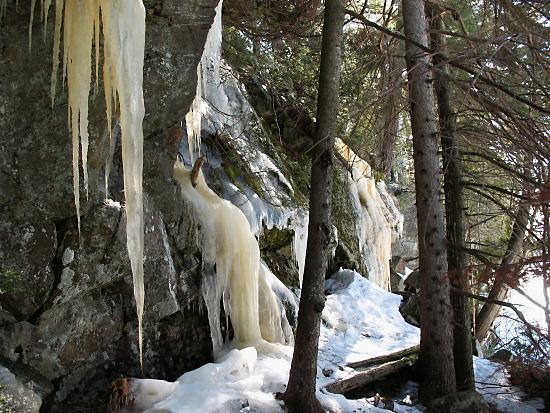 Algonquin
photo - mw

photo - mw
_______________________
Thinking, Ludwig Wittgenstein once reminded us, is digestion; thinking, in other words, is that much a component of who we are.
If you don't use your own imagination, Ronald Sukenick once reminded us, somebody else is going to use it for you.
Narratological Amphibiousness, or: Invitation to the Covert History of Possibility
Lance Olsen ebr
..we must begin to think of postmodernity less as a discrete historical period than as a diffuse ahistorical state of consciousness whose propensity is for opening up and out rather than closing down and in - a mode of perpetual questioning (of language, of form, of experience) that leads to a position of perpetual floating. When I speak of Narratological Amphibiousness, I am thinking of the conversation implied among such diverse writings as, for instance, Nietzsche’s Thus Spake Zarathustra, whose project is to fuse and confuse radical skepticism with fictional narration with lyric poetry with visionary rant; and, more recently and radically, Burroughs’ appropriation and manipulation of science-fiction tropes in the Nova Trilogy; and, more recently still, Carole Maso’s stunningly subjective discourse-travel along the edge of poetry and prose, or Laird Hunt’s wonderful 2001 debut, The Impossibly, a warped metaphysical detective narrative which reads as if Donald Barthelme were channeling Alain Robbe-Grillet, Paul Auster, Ben Marcus, and reruns of Get Smart, where a mysteriously afflicted unnamed narrator unravels lightheartedly, suffering memory lapses, ominous clubbings at the hands of strangers, and a sort of existential aphasia as he drifts through an increasingly shadowy universe....(more)
_______________________
 scrolling
From
Le Diverse et Artificiose Machine
Agostino Ramelli
1588 Disciplining Literature
Stanford Humanities Review Volume 6.1, 1998
_______________________
Address to the Reader, from Pevensey Sluice
Veronica Forrest-Thomson
If it were quicksand you could sink;
something needing a light touch
soon and so simply takes its revenge.
Slightly west of Goodwin Sands
the land hardens again with history,
resists the symbol.
Chalk requires an allegorical hand,
or employee of Sussex Water Board
who sets a notice here:
DANGER SUBMERGED STRUCTURES
and all at once Transformational Grammar
“peoples” the “emotional landscape”
with refutation.
You may hear its melancholy
long withdrawing roar
even on Dover beach watching
the undertow of all those trips
across to France.
Follow the reader and his writer,
those emblematic persons
along their mythic route
charting its uncertain curves and camber;
for to be true to any other you must —
and I shall never now — recover
a popular manoeuvre known mostly as,
turn over
and go to sleep.
Veronica Forrest-Thomson - Five Poems
Feature: Veronica Forrest-Thomson, 1947-1975
Jacket 20 - December 2002
Veronica Forrest-Thomson: Collected Poems
Shearsman Books
Poetic Artifice: A Theory of Twentieth-century Poetry Veronica Forrest-Thomson google books
The only coherence, finally, is on the level of technique. I think that ‘our metaphysics’ is this new technique of disconnected imagery which is the doom of fate of the twentieth-century poet, who must simultaneously be detached and involved with language. This means that he has all the tricks of rhetoric and the skills of language but he must not make the mistake of thinking that they solve anything. He has the level of meaning—all the words in ‘whispers’ make sense—without its extension. Before he can appropriate the external world he must deny it to himself, and this requires him to ‘learn’, as one of Empson’s poems has it, ‘a style from a despair’. He must develop new techniques in order in the end to be able to use the old; as Bradley said of the speculative philosopher, to converse with shadows he must himself become a shade.
- Forrest-Thomson, Veronica. Poetic Artifice: A Theory of Twentieth-Century Poetry.
_______________________
Expiration Notice - Volume 1
Currently, there are several online sites, print publications and competitions that cater exclusively to young and emerging photographers- and god bless 'em! This site however, will serve as an online gallery for those who've already lived a life, continue to do so, and have the quality goods long denied the glory of the the glossy magazines or gleaming white gallery walls. We may not do much in the way of fame and fortune, but we may get you a few well deserved seconds of recognition.
via Tim Atherton
_______________________

crustal cluster
Nobuhiro Fukui via gmtPlus9 (-15)
_______________________
Reading the Modern Photobook: Changing Perceptions
in conjunction with Looking In: Robert Frank's "The Americans"
_______________________
from
Cities and beaches
Sigfús Daðason (1928 - 1996)
Translation by Eiríkur Örn Norðdahl
XIV (excerpt)
(....)
2
What ship lies anchored by the harbour-mouth
at midmorning between mountain and mountain …
on which wholly new day did we step ashore here
… will we step ashore here?
No risk of encountering machine-guns and rags on this harbour.
Will we perhaps here meet the excessive gleam of imminent death
and other obsolete judgments like it?
Will we forget that this place is linked to others
thread on a chain with other places?
Peculiar chain: here it was forged from gold and silver
there it was processed from the blood of the disgraced.
Everywhere it is ornate with high ideals
of morality and freedom.
– Let us now forget that the chain is one
since here it wasn’t forged from oil’s exclusive freedom
and the ennoblement of sugar-fields.
(....)
I surely know that the din of time is persistent
compared to the momentary haste when a nation’s life
runs onto the solitary blade of justice.
I do not mean to say that time can not just as well
be a different creation.
I know that the messengers of justice are ineffectual
until the audience is willing.
And even though it were some other way
caution must be taken and remember
that nothing is more terrifying than justice.
Still we’ve witnessed that the time eventually arrives
when all our options are hard.
The day will come when deception is deception
disgrace disgrace
no matter how splendid it’s lair once was
no matter how deep the noble idealists
would bow before it into the dirt.
...(more)
Icelandic poets in EnglishTranslatec by Eiríkur Örn Norðdahl
_______________________
Interview on Icelandic Poetry
Eiríkur Örn Norðdahl
> Does poetry have a special role to play in Iceland because Icelandic is a relatively small language, in terms of the number of its speakers? Is it closely connected to people’s sense of national identity?
Special role, is a difficult concept to grasp for me – but I’d say it was important, although more or less important than in larger countries, I can’t say. It’s certainly part of the mythology of Iceland (99% of what gets said about Iceland and Icelanders by themselves (and by association foreigners) is halftruths at best). The language was purified in the 19th century and the beginning of the 20th, by the nationalist movement (whose leaders were in great part poets) - so danish influence was cleaned out and Icelandic went a couple of centuries backwards in terms of vocabulary, with neologisms for newer foreign words to boot. Dialects were more or less done away with as well. Spelling was made uniform in the beginning of the 20th century, and has stayed mostly the same since (the Z was removed in the seventies, and some other minor adjustments have been made). So what this does is it builds a bridge that extends towards the Sagas and the Eddas, but to do so the bridge passes over alot of the 18th and 17th century writing – with it’s ununiform spelling, vocabulary and weirdnesses (the Sagas and Eddas are of course harder to read – but usually people are just happy and proud enough to be able to understand anything at all - and as far as that goes, my theory of us having a better understanding for 17th and 18th century literature, had we not gone through such rigorous nationalism, is a theory built more on feeling than research). A lot of people even claim to have difficulty reading Laxness, since he had the misfortune of learning to read and write before spelling was made uniform – but all it is is a couple of extra accents on a few letters. Icelanders are used to their language being very uniform, and they respond badly to any breakingoftherules. And therefore they are impatient with foreigners, for example, who are trying to learn the language, and often switch quickly to english (this is getting better though, as the people get more used to foreigners, who had literally no presence in Iceland up until 15 years ago, maybe – only 10 years ago I remember hearing about foreigners not being interviewed on the state radio because of their accents).
So – purist, uniformist and nationalist language, without dialects, loan-words or accents, foreign or domestic. It’s a bit of a prison – but it also means there’s work to be done for poets. It’s an interesting language for a poet to work in. Like fiddling with virgins. ...(more)
_______________________

Ms. Booth's Garden
Jack Kotz
via Ordinary finds
_______________________
YouTube Education: 80 Intelligent Video Collections
(Stanford, UC Berkeley, Duke, and UCLA)
lectures, courses and other videos available for free download.
distributed under a Creative Commons license _______________________
Cross-Cultural Poetics
Hosted by Leonard Schwartz
produced in Olympia, Washington at The Evergreen State College's KAOS-FM
Pennsound
"...six years' worth of episodes from this innovative program, which showcases some of the most influential international voices in contemporary poetics."
_______________________
Ghost Dance in 33 Movements
Anny Ballardini
Otoliths
Anny Ballardini is the unofficial poet laureate of UbuWeb; from her perch in Italy she has watched the 20th century avant-garde stream through her computer's screen and has taken copious notes on it. These notes—at once literary criticism, poetry, oblique autobiography and amazing eavesdrop—come to us as an idiosyncratic transcript of a cultural and personal archive. This is 21st century ekphrasis written to an art that flickers and sings and sometimes screams.
- Susan M. Schultz
Interview with Anny Ballardini
Tom Beckett e-x-c-h-a-n-g-e-v-a-l-u-e-s
... better walk through the Middle Ages at a young age when vigor and natural strength -imbued by ignorance but brightened by intuition- are with you, than reaching them when you are 40. Personal life as an historical corpus. From here obedience, the hiding, shyness, and my interest in books, a metaphysical search, an endless branching into what I did not know. As Vico so brilliantly stated, to the primitive stage follows classicism that deteriorates into decadentism to start again and at a more complex evolutionary level from primitivism. Stroboscopic openings the passages of which have to be visited/lived through. Joy of life will come back with moments of perfection followed by detachment, refusal or a decadent liberal living _to be able to get rid of the snake’s skin; escapes and come backs, perfection and disaster, glory and ignobility, this the going of a man, and I have received much already, now that I am: “Nel bel mezzo del cammin” di mia vita.
Ezra Pound through Terrell: ’e lo soleils plovil’ (thus the light rains, Canto IV, Pound’s rendering of Arnaut Daniel’s on lo soleills plovil), the light-water-stone progression ending in crystal; i.e. the transmutation of fluid transparency of subjective experience into the objective solidity of stone through poetry; the alchemist’s fabrication of the philosopher’s stone by palingenesis”.
No elements are missing: light, in this complete cycle, can be interpreted, and this is probably the original meaning, as the burning of the sun through the air _the fusion of hydrogen into helium. Fire provoking combustion, the energy that moves the spheres. An adept of fire was Rudolf Steiner with his explanation of fires as the points in which people, drawn by at/traction, interest or curiosity, meet.
And through the philosopher’s stone we have redeemed the Middle Ages with their complex and marvelous symbols that defy those who enter the period with a scientific mind....(more)
Anny Ballardini maintains NarcissusWorks and is curator/editor of Fieralingue's Poets' corner
_______________________
E.E.= (mc²)²
Mark Young
unJust
string. the
whirl is mud-
dled. in Brussels
the brittle-
brained Walloon man
bristles par ennui
an inedible hum
coming from car pools &
patisseries & it's
spiraling
...(more)
Spring Anthology at the Poet's Corner - Fieralingue.
_______________________

Thresholds
Xavier Ribas
"In 1924 Walter Benjamin and Asja Lacis travelled together to Naples and wrote a wonderful essay in which they reflected on the image of ‘porosity’ suggested to them not only by the geology upon which the city was raised, but also by its architecture and street life. Benjamin and Lacis saw the streets of Naples as a public stage inundated by private worlds. They saw the houses less as “the refuge into which people retreat, than the inexhaustible reservoir from which they flood out”, making the domestic life into a kind of street theatre. Living rooms, bedrooms and dining rooms were improvised on the pavement in a “constellation of unpredictable situations”. Everything in Naples seemed to be in a transitory, inconclusive or fluid state, such as the church entrances, "those inconspicuous doors, often only a curtain”, which, however, were a “secret gate for the initiate”.
The notion of threshold refers to the symbolic and physical delimitation and differentiation of space. The threshold is a space of transition, an ‘in-between’ which, in the disciplines of geography and architecture, is subject to a process of symbolic condensation. The images in this series represent entrance doors of a number of banks and financial institutions in the City of London and Amsterdam. These thresholds seem to associate the nature of the interior space of capital to the sacred and the funerary, in apparent contradiction with the corporate aspirations of transparency, circulation and luminosity. The images make visible the traces of little incidents ocurred at the threshold itself, trying to visualise this 'space of transition' as a possible space of inhabitation, and suggesting, perhaps, the opposite of porosity and acessibility which Benjamin and Lacis were so seduced by in Naples."
- Xavier Ribas
|

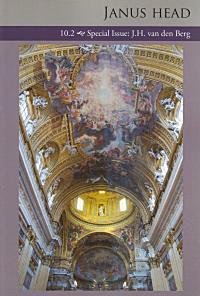 Janus Head
Janus Head
 The Age of Briggs & Stratton
The Age of Briggs & Stratton





















































